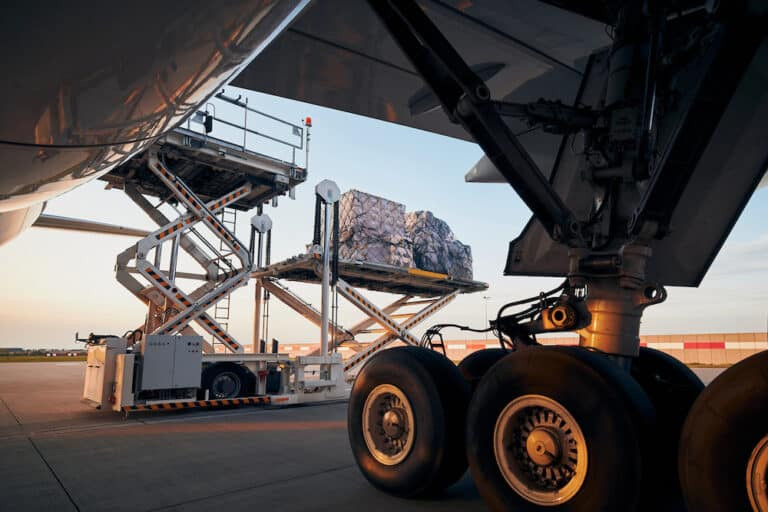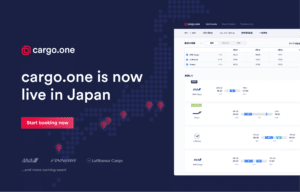Over the past few years, international trade has experienced disruption on a global scale not seen before, sparking a race to adapt. For businesses, it swiftly became clear that change was required to not just make it through the past few years but, also, to future proof the air cargo industry from potential shocks.
cargo.one has positioned itself in this sector, providing a booking platform that can help companies search, compare, book and track air cargo capacity. Recently launching in Japan, the company is seeking to expand within the Asia Pacific region, capitalising on extensive digital transformation efforts designed to use technology to improve processes and customer experiences.
The global trade sector is still battling a number of challenges globally, with the ongoing conflict in Ukraine, labour shortages, the growing impact of climate change and more. For supply chains to be able to navigate through periods of volatility, businesses are recognising that embracing the digital revolution in the air cargo sector is the way to weather storms.
The Asian market was an obvious choice
“Air cargo is global and so for us to meet the needs of our customers and partners we need to be global too. Japan being one of the largest air cargo markets, it was always on our radar,” José Paz Rendal, head of expansion at cargo.one, said.
Having developed local partnerships with ANA Cargo, as well as relationships with companies that have a strong presence in the market, such as Finnair and Lufthansa, the company saw an opportunity to offer a new service to Japanese businesses. “After starting in Europe four years ago and expanding into North America last year, we felt it was the obvious choice for us to enter the Asian market,” Paz Rendal added.
The freight forwarding industry has plenty of potential when it comes to reimaging operations for the digital age, replacing old and slow methods with advancements that save time and bolster productivity. “We have found that Japanese forwarders are very receptive to digital options but until now lacked a solution like cargo.one to help them make the switch confidently,” Paz Rendal said.
The room for expansion and further digitalisation across the Asian market has already seen cargo.one sign deals with major carriers in the region, such as Singapore Airlines, JALCARGO and MASKargo. “Japan was the first step in our expansion in the region, but we have big plans to expand further in the near future,” Paz Rendal revealed.
Read more: Shippers make international trade happen
Protecting against pandemic era disruption
There is no question that the pandemic and subsequent supply chain disruptions have left their mark, with many businesses seeing turmoil as the greatest risk to their growth and regional economies. Bank of America laid this out at the start of 2022, citing how references to the “supply chain” in Q3 earnings calls by Fortune 500 companies rose by 412% from the same period in 2020.
While, before Covid, digitalisation was just seen as one tool that could benefit businesses, it’s now become a core pillar for businesses working to protect against potential vulnerabilities. At the management level, it’s about increasing productivity by saving time, responding to customers faster and getting access to more capacity in the market, allowing forwarders to secure more shipments and bolster their margins, all while ensuring business continuity.
“Since before the pandemic, digital booking platforms like cargo.one have seen triple digit YoY growth. While the past two years have seen unprecedented pandemic-era disruption, digitalisation has helped the industry to remain dynamic and resilient, keeping goods flowing and adapting business models as needed,” Paz Rendal stated.
“We see strong and permanent structural shifts, as digital capabilities grow and digital cargo booking becomes the norm, not the exception,” Paz Rendal highlighted, as companies embrace the need for real-time visibility and better planning tools.

The smart way to book air cargo
Traditional channels of communication, such as phone and email, have proved to be not reliable enough methods of operating for shippers, with information changing rapidly during challenging periods of instability. Making a booking under the old system could have seen a shipper waiting 2-3 days to receive a quote and spending hours arranging the shipment, all of which has to be done within specific business hours.
“If you ask the people actually making bookings, export agents for example, they simply want a better way of booking air cargo. We’re in 2022 and nobody likes unnecessarily having to call or send emails and wait to get responses to book shipments.”
When the market is rapidly changing, freight forwarders need to be able to quickly find up-to-date information, avoiding potential cancellations or delays. Digital platforms provide accurate information and allow businesses to avoid the nightmare of juggling time zones or waiting for replies from half way across the globe. Embracing platforms, like cargo.one, gives companies access 24/7, 365 days to a service, skipping the hassle and helping businesses run efficiently and effectively.
“No matter when, you can access real-time capacity and rates on cargo.one, place or update bookings and track your shipments. This proved especially important at the beginning of the pandemic, when the situation was changing by the day and companies struggled with the switch to working from home.”
Read more: Drones: The next transport revolution
Remaining at the forefront of the digital revolution
In a market that is filling with companies who want to capitalise on the digitalisation drive, it is crucial for technology providers and their clients to lead the digital revolution through innovation and a customer-focused approach. “When it comes to product development, we are constantly thinking about how we can make our customers’ lives easier, save them time, make it easier for them to compare offers and make decisions, etc.”
It’s not just about putting the technology providers themselves in a key position but about working across the sector to push through change in a way that helps bolster the sector as a whole. “By improving the experience for forwarders, our partner airlines benefit too, as it’s now much easier for forwarders to book with airlines they perhaps had never booked with in the past.”
“Digitalisation is helping to transform jobs. It ensures that teams focus on the most value-adding tasks and give more simple, process-driven tasks to digital,” Paz Rendal explained. When customers are seeking simple solutions to increasingly complex tasks, a mixture of real people and technology provides an important collaborative approach to meet the needs of forwarders and airlines.
Digital booking platforms have, so far, delivered good results, cutting manual work, growing reach, freeing up time and better meeting market demands at speed “Today, the question is no longer about whether to go digital, but how fast digitalization can progress, with both forwarders and airlines pushing ahead on all fronts. We expect the proportion of digital sales to overtake offline sales channels in just a few years time. We’re really ambitious about building on our core product to help digitalise more business processes and activities for our customers, so the future is very exciting.”






